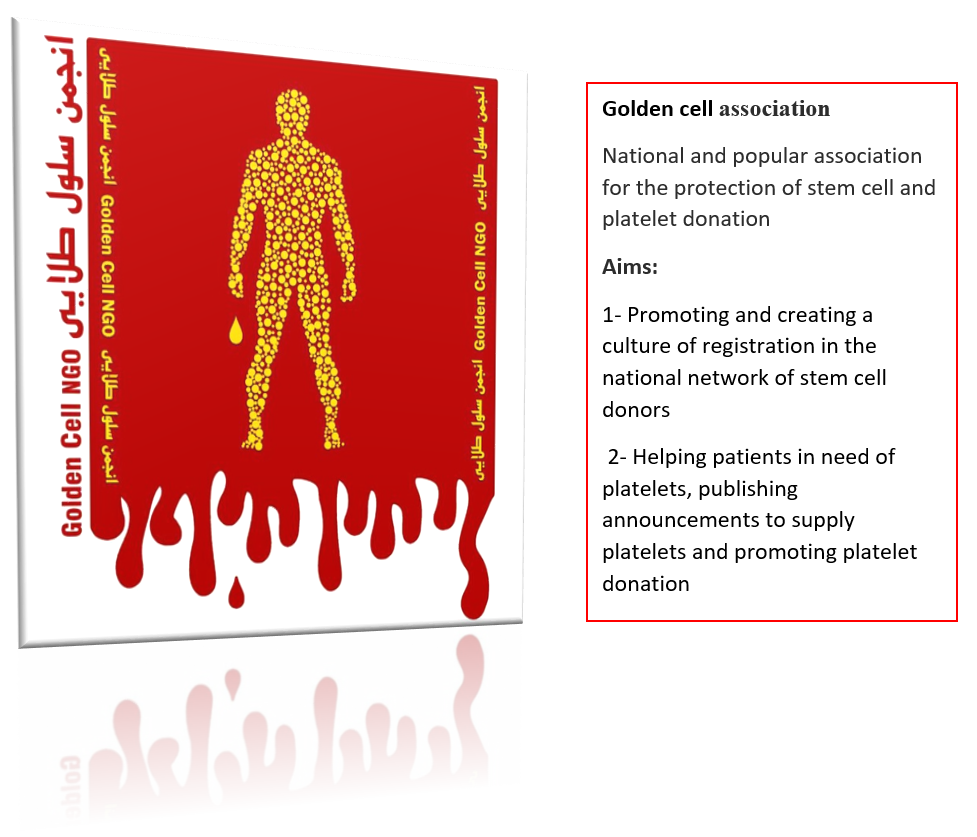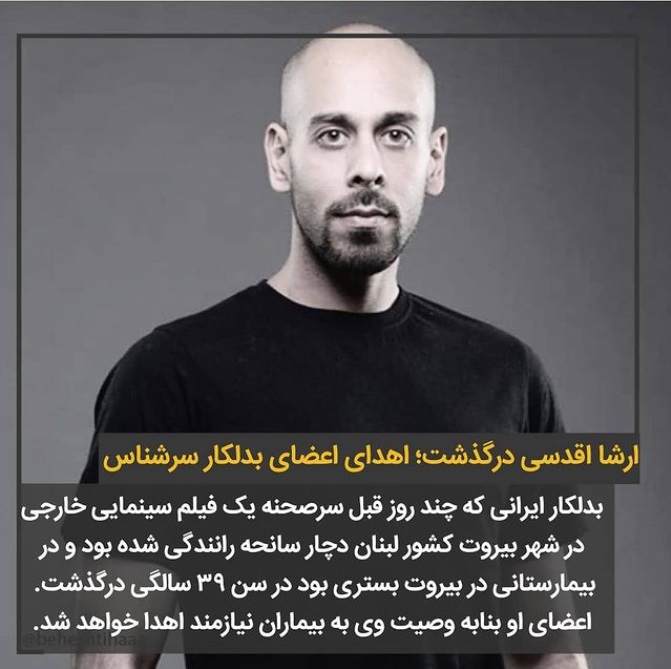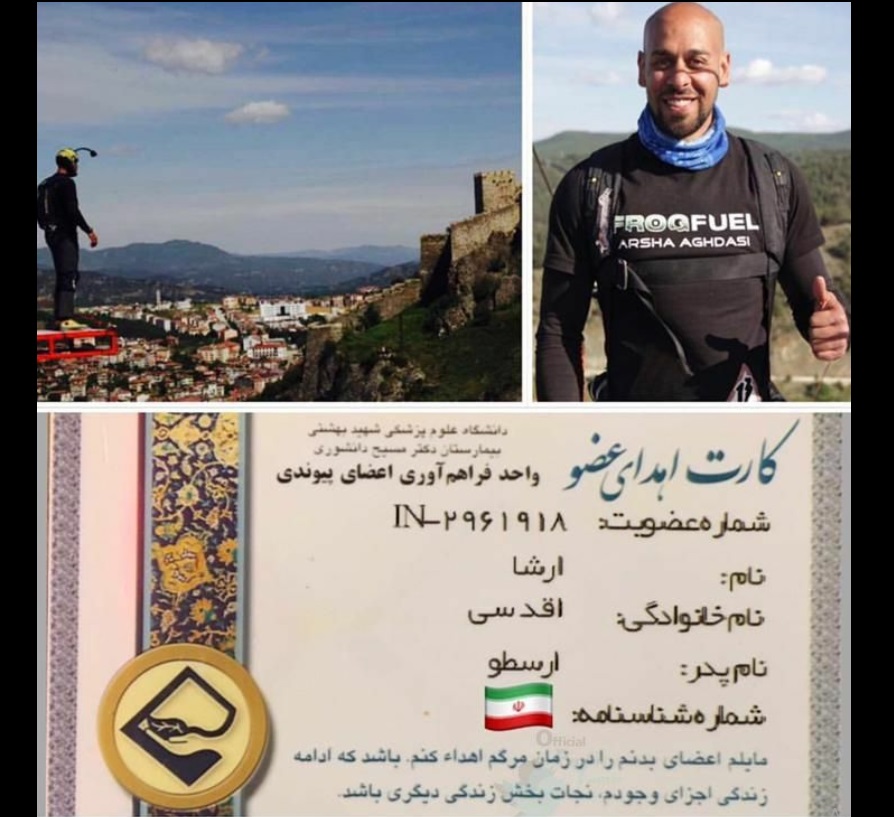
اهدای زندگی Life Donation
به نام خدا، مطالبی راجع به اهدای عضو-اهدای سلولهای بنیادی-اهدای خون-اهدای پلاکت-اهدای پلاسما با همکاری کانون اهدای زندگی دانشگاه بناب--- آدرس صفحه اینستاگرام: ehda.zendeghi@
اهدای زندگی Life Donation
به نام خدا، مطالبی راجع به اهدای عضو-اهدای سلولهای بنیادی-اهدای خون-اهدای پلاکت-اهدای پلاسما با همکاری کانون اهدای زندگی دانشگاه بناب--- آدرس صفحه اینستاگرام: ehda.zendeghi@Golden cell association
National and People's Association for the Support of Stem Cell and Platelet Donation
:Aims
Promotion and culture of registration in the national network of stem cell donors in order to enrich the stem cell bank of Iran, help patients in need of platelets, publish announcements to supply platelets and promote the culture of donation
Stem cell transplantation is the only way to treat many serious blood diseases such as cancer, immunodeficiency and thalassemia major, etc
Hematopoietic stem cells are transplanted from the peripheral blood of a healthy person in a similar way to blood donation to the patient and this is not harmful to the person who wants to donate
Because of the need for genetic donor similarity to the patient and the low likelihood of this similarity, you may be the only savior of a life

Learn more on the social networks @Goldencells
Persian page link : https://ehda-zendeghi.blogsky.com
Translator : Javad Eynaki Maleki
Difference between blood donation and blood plasma donation - blood plasma applications
Plasma donation is done with the device, and only a yellow hatch is taken and the blood itself returns to the person, but the process for blood donation is in a way that blood completely enters blood bags. Of course, after blood donation, the same bag can be extracted, but the plasma volume with blood donation is one third of the plasma volume that can be taken independently by the device. Annually 500,000 liters of plasma are produced in the country, which produces 300,000 liters of private sector. The blood transfusion organization produces 200,000 liters of plasma from blood donated by people.
Plasma usage:
The obtained plasma is sent to plasma refinery centers for injection to patients or to produce specific pharmaceutical products derived from plasma.
Difference between brain death and coma: organ donation for brain death person
Brain death and coma are scientifically two completely different processes!
It is usually wrongly assumed that a brain-dead person has a chance of recovery, such as a person who has been in a coma. If you've heard that a person has suffered brain death and then recovered, it hasn't actually been brain death. Patients who have recovered are in fact in a deep coma, and after returning from a coma, their relatives or sometimes even some doctors and nurses who do not have enough information about the difference between brain death and coma have made such a misconception!
Therefore, sometimes relatives of a brain dead person mistakenly assume that he has a chance of recovery and return, so they do not consent to organ donation in the hope of recovery.
In a coma, there is a chance for some patients to recover, while brain death is, in medical terms, absolute death, and the person will never alive.
In brain death, the patient's recovery is impossible and his death within a few days is inevitable. Therefore, the opportunity to donate a brain-dead person's organ is limited to a few days!
Coma recognition
Cortical cells are highly sensitive to hypoxia, so when blood flow to these cells is stopped, they quickly become seriously and sometimes irreversibly damaged. In this case, the person quickly loses consciousness and, depending on the extent of damage to the cerebral cortex, his reactions to environmental stimuli are reduced. However, there is still the possibility of improving the condition and returning the consciousness of the disease that has gone into a coma.
Recognizing brain death
Brain death is the cessation of all brain activity and brainstem at the same time. a person with brain death is actually a person who, due to extensive brain damage, has been unable to communicate with his surroundings, cannot speak, does not see, does not respond to painful stimulations. A person with brain death is also unable to breathe spontaneously. Although he has a heartbeat, he has no recordable waves when we record his brain waves. His heart rate continues with the help of a ventilator and maintenance measures to keep donated organs in optimal conditions for transplantation. Brain death in medical science is absolute death and this person will never come back to life.
اندیشه والای زنده یاد ارشا اقدسی در خصوص اهدای عضو
اندیشه والای زنده یاد ارشا اقدسی در خصوص اهدای عضو، حاکی از قلب مهربان و روح بزرگ ایشان بود. روحش شاد و یادش گرامی


Organ donation after brain death or cardiac death (typical death)
With the consent of the parents, all those who have suffered from brain death or cardiac death (normal death) can have their organs removed and transplanted into patients. All over the world, a few decades ago, brain death was considered equivalent to definite death, and in our country, according to the law (approved in 1379), brain death is equivalent to death. According to the same law, organs are allowed to be removed from cases of brain death as well as cardiac death with the consent of the family and its transplantation.
Organ donation after brain death:
The main human organs such as the heart, lungs, liver, kidney ... due to having the main blood vessels are destroyed as soon as they die. Therefore, these organs can only be removed from cases of brain death, and after removal, they can be stored for a short time and must be transplanted immediately. The donor should not have AIDS, hepatitis or cancer and should not be older than 60 years.
Organ donation after cardiac death:
Tissues such as bones, heart valves, tendons, corneas, etc. live longer and can be removed after normal death (cardiac death) and can be stored for years. Therefore, in cases of death (cardiac death), if the person does not have an infectious disease and timely information and consent is given, the tissue can be removed. The donor should not have AIDS, hepatitis or cancer and should not be older than 60 years.
----------------------------------------------------------------------------------------
Difference between brain death and coma:
Brain death is a state that the brain goes away and dies, but because the spinal cord is alive, the rest of the members (such as the heart) remain alive for a few days; In this case, the person's breathing is discontinued and there is no medical reflection of the individual's improvement or alive, and as soon as the devices are disconnected and the person dies, and with the device and medical care, there are only a few days of "vegetative state" for the individual.
Brain death differs with anesthesia or coma, and most of the accidents occur. To confirm brain death in Iran, they will keep watching 24 hours, and after a variety of experiments and approval of the six specialist appointed by the Minister and Forensic Medicine, and the work of transplantation should be done only in government universities.
Transplant recipients:
Transplant recipients are placed on the waiting list based on blood group, intensity of need and waiting time, and at the same time as the family consent of the deceased for organ donation, a number of transplant recipients will be examined in terms of size and weight and tissue matching tests to make the organ the most suitable person.
Transplant cost:
For a member or tissue, there is no way to pay a donor or receive a recipient, but it is costing for surgical procedures and member maintenance and experiments that are covered by insurance, and the government is paying most costs.
In the operation of organ harvesting from the deceased, the body is not mutated and replaced with the harvested prosthetic organ so that the shape of the body does not change.
Having a member card donor and written will is not enough! Family satisfaction is required:
It is imperative that even if the family consent, in the event of membership in this plan or written will, fails to prevent this. So, in order to ensure that this heart desire is made, keep your relatives from having a donated card and this benevolent decision.
Persian page link : https://ehda-zendeghi.blogsky.com
Translator : Javad Eynaki Maleki